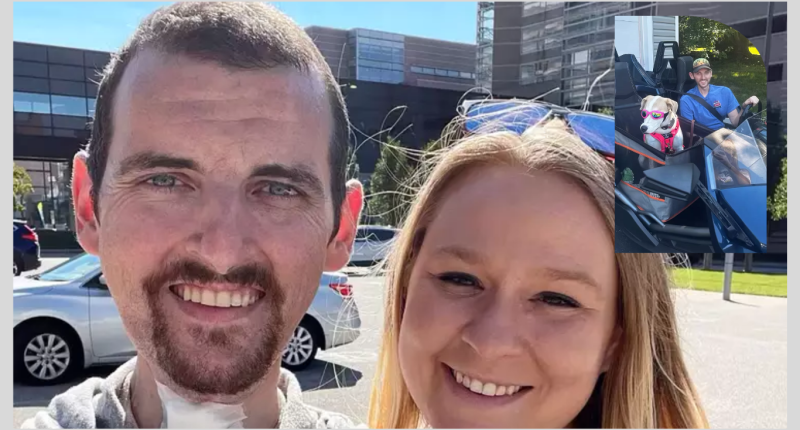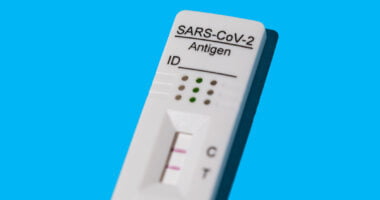Chronic sinus infections can often be dismissed as mere annoyances, but for Aaron Agler’s Cancer Diagnosis, they were a harbinger of something far more serious. Aaron Agler’s story serves as a sobering reminder that persistent sinus issues can sometimes mask a more serious underlying condition. At just 27 years old, this Ohio man’s recurring sinus infections turned out to be a sign of nasopharyngeal rhabdomyosarcoma, a rare type of soft tissue sarcoma.
Aaron Agler’s Chronic Sinus Infections Journey
Aaron Agler’s journey began with what he thought were typical sinus infections. Despite numerous visits to healthcare providers and courses of antibiotics, his symptoms persisted. Alongside the recurrent infections, he experienced unusual snoring that was initially mistaken for sleep apnea. This case highlights a common misconception: chronic sinus infections can sometimes mask more serious underlying conditions. Recognizing when symptoms deviate from the norm is critical for timely diagnosis.
The Diagnosis of Nasopharyngeal Rhabdomyosarcoma
In February 2018, after extensive testing, Agler received a shocking diagnosis: nasopharyngeal rhabdomyosarcoma. This rare soft tissue cancer, typically found in children, was located in the upper throat, threatening his ability to breathe and swallow. According to the National Cancer Institute, this type of cancer is uncommon in adults, making Agler’s case particularly unusual. The rarity of his diagnosis underscored the need for specialized care and a comprehensive treatment plan.
“It got to the point where the doctor was like, ‘OK, no more antibiotics. Something else is going on here,’” his girlfriend Danielle Styer, 31, told TODAY, speaking on his behalf after his disease impacts his voice. “When he looked in his mouth … it looked like the roof of his mouth was heavy, like pushing down.”
:max_bytes(150000):strip_icc():focal(795x213:797x215):format(webp)/aaron-agler-cancer-journey-6-082624-a1905883119542959fdc99d981e229e0.jpg)
Treatment Journey
Agler’s treatment commenced with a rigorous regimen of 40 weeks of chemotherapy, interspersed with six weeks of radiation. Initially, there was hope that this approach would effectively combat the cancer. However, scans at the 12-week mark revealed that the tumor was not responding as anticipated. The challenges intensified when Agler required a tracheostomy to assist with breathing, illustrating the severe impact the cancer had on his quality of life.
Surgical Interventions and Breakthroughs
After several failed treatment attempts, Agler underwent an extensive reconstructive surgery known as stereotactic body radiation therapy (SBRT). This innovative approach allowed doctors to deliver high doses of radiation directly to the tumor while minimizing damage to surrounding tissues. Despite the risks, including potential long-term side effects, Agler’s medical team was determined to eradicate the cancer. Remarkably, after a grueling 19-hour surgery, Agler was declared cancer-free, a monumental achievement in his battle against the disease.
Life After Cancer
Today, at 34, Agler continues to navigate the aftermath of his treatment. While he is cancer-free, he faces ongoing challenges, including speech difficulties and the potential for lifelong side effects from his surgeries. Agler’s journey emphasizes the importance of a strong support system, as his girlfriend, Danielle Styer, played a crucial role in advocating for his health and well-being throughout his ordeal.
:max_bytes(150000):strip_icc():focal(528x0:530x2):format(webp)/aaron-agler-cancer-journey-4-082624-99a38920c31f4bacb031bfc98f4fa698.jpg)
The Link Between Chronic Sinusitis and Cancer
While Agler’s case is an extreme example, there does appear to be a potential link between chronic sinus inflammation and certain types of cancer. A study published in the journal Cancer Risk in Chronic Rhinosinusitis found that patients with chronic rhinosinusitis (CRS) had a significantly higher risk of developing cancers in the head and neck, colon, liver, lung, skin, breast, prostate, and bladder compared to those without CRS.
Chronic Inflammation and Cancer Risk
The study authors suggest that the chronic inflammation associated with CRS may contribute to the development of these cancers. Over time, the abnormal changes in the tissue lining the sinuses caused by persistent inflammation could potentially lead to cancerous growth. However, it’s important to note that most people with chronic sinus issues do not go on to develop cancer.
Distinguishing CRS from Cancer
Given the similarities in symptoms, distinguishing chronic sinusitis from sinus cancer can be challenging. Persistent one-sided nasal congestion, nosebleeds, and facial pain that doesn’t respond to standard treatments may be cause for concern. A thorough medical history, physical examination, and diagnostic tests like endoscopies and imaging scans can help determine the underlying cause.
Expert Insights and Recommendations
Healthcare professionals stress the importance of early detection and the need for patients to advocate for themselves. Agler’s experience serves as a reminder that persistent symptoms, such as chronic sinus infections, warrant thorough investigation. Seeking second opinions can also be invaluable, particularly in complex cases involving rare diseases. Given the potential risks associated with chronic sinus infections, healthcare professionals recommend the following:
- Seek Regular Medical Evaluations: If you experience recurrent sinus infections, consult an ENT specialist to rule out serious conditions. Regular check-ups can help monitor any changes in symptoms.
- Advocate for Yourself: If you feel your symptoms are not being adequately addressed, do not hesitate to seek a second opinion. Early intervention can be crucial in managing potential health issues.
- Monitor Symptoms Closely: Keep track of any new or worsening symptoms, particularly those that are unusual or persistent. This information can be vital for your healthcare provider.
- Consider Lifestyle Factors: Smoking, exposure to certain chemicals, and a family history of cancer can increase your risk. Discuss these factors with your doctor to better understand your risk profile.
FAQs
Q: What are the symptoms of nasopharyngeal rhabdomyosarcoma?
A: Symptoms may include chronic sinus infections, nasal obstruction, and unusual snoring.
Q: How is nasopharyngeal rhabdomyosarcoma treated?
A: Treatment typically involves chemotherapy, radiation, and possibly surgery, depending on the tumor’s characteristics.
Q: Can chronic sinus infections indicate cancer?
A: While chronic sinus infections are often benign, persistent symptoms should be evaluated by a healthcare provider to rule out serious conditions.
Conclusion
Aaron Agler’s story is a powerful reminder of the potential consequences of ignoring chronic health issues. His journey from misdiagnosis to successful treatment underscores the importance of vigilance, early intervention, and the support of loved ones. As Agler moves forward in life, his experience can inspire others to seek answers and advocate for their health.
Also Read | Travel Writer And TV Host Rick Steves Reveals Prostate Cancer Diagnosis









